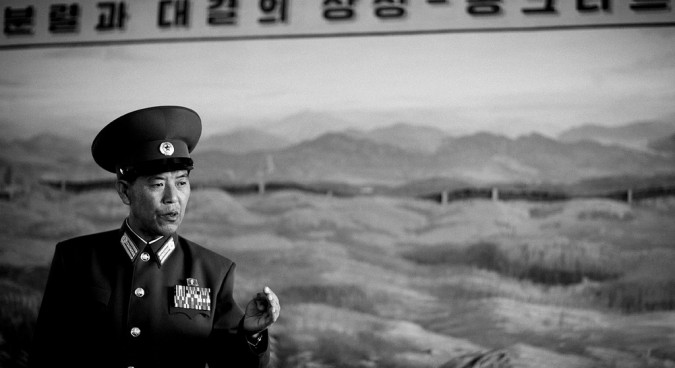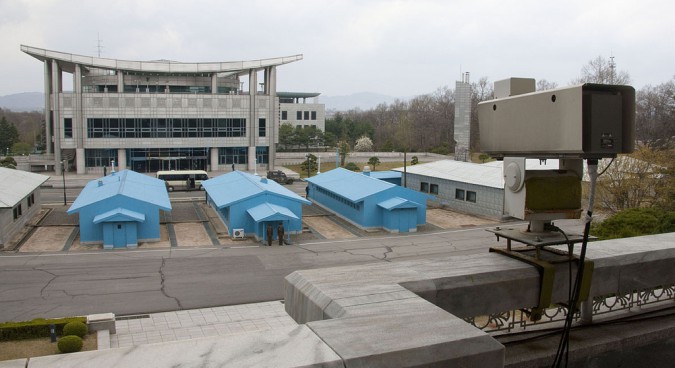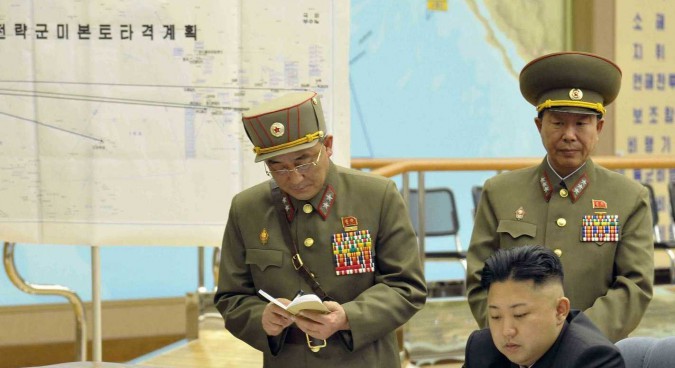
Crossing the line: Responding to North Korean provocation
A new book examines how the DPRK gets away with its over-the-top behavior
A tepid response from Washington to North Korean aggression has led to additional attacks by convincing Pyongyang that American threats aren’t to be taken seriously.
So argues Van Jackson of the Asia-Pacific Center for Security Studies in his book Rival Reputations: Coercion and Credibility in U.S. North Korea Relations. He demonstrates that a series of incidents that were followed up by the U.S. backing down, and with one incident that did result in a show of force – Operation Paul Bunyan following the notorious 1976 ax murder incident in Panmunjom – resulted in fewer acts of violence against American personnel.
However, he told NK News that a broader Cold War context helps explain such fluctuations, especially after 1976.
He also said that, despite South Korea’s stronger reaction to the 2010 Cheonan and Yeonpyeong incidents, the reduction of North Korean violence directed at South Koreans is unlikely to last, because “credibility has a shelf life.”
NK News: Where did the idea for this book come from?
Jackson: I was working on the “Korea desk” in the Pentagon during the Cheonan attack and the artillery shelling of Yeonpyeong in 2010. Those real-world crises – which everyone treated like the Cuban Missile Crisis at the time – had the feeling of manufactured ritual despite the high stakes. That whole experience gave rise to three personal frustrations.
Firstly, like everyone else, I was frustrated that these kinds of small-scale attacks kept happening. They’re the “pipsqueak fourth-rate power,” to quote Nixon, and yet we were the ones continually taking it on the chin? Second, I was even more frustrated by the “cycles of provocation” narrative that the U.S. government used to describe North Korean violence, not just because it conflated everything North Korea did as a “provocation,” which muddied the conceptual waters, but it also made it sound like we played no role in the tension dynamics.
They’re the “pipsqueak fourth-rate power,” to quote Nixon, and yet we were the ones continually taking it on the chin?
The third frustration was that everyone in the U.S. government liked to talk about “pressure” and “cost imposition” and “teaching North Korea a lesson,” yet in the heat of the moment those same people could think of nothing but the risk of escalation – chicken hawks.
I was starting to see a pattern: North Korea talks tough, we talk tough, North Korea gets violent, we back down… while talking even tougher. Over time, our policies were simultaneously inflaming hostility with an adversary while repeatedly showing them we did not seek to take any risks. That’s crazy, and untenable.
So I knew logically that a weak state will never repeatedly attack a stronger state unless they believe that the stronger state is unwilling to muster an adequate response. The research question just flowed from there. Did North Korea believe we wouldn’t respond to small-scale attacks? Why? So that got me interested in the history, and the rest is … well, history.
NK News: Your book describes a number of violent incidents the North has carried out against the United States that it’s difficult to imagine would be tolerated now, yet they were at the time. Those appear to halt after the tree-cutting incident: Does the U.S. response to that episode fully explain this or does the shift in overall Cold War dynamics play a role?
Jackson: Yeah, I think in the mythology of North Korea watching, the 1976 Panmunjom “ax murder” incident looms a little larger than it should, and the narrative I present in the book probably doesn’t help.
I was starting to see a pattern: North Korea talks tough, we talk tough, North Korea gets violent, we back down … while talking even tougher.
The short answer is that the U.S. response to that episode played a small but positive role. The long answer is that the resolve the alliance demonstrated with Operation Paul Bunyan put North Korea on notice, but only in the near term. That whole incident took place against a backdrop of us no longer being tied down in Vietnam, and a new presidential administration (Ford) coming into office feeling a need to be tougher reputationally given the withdrawal from Vietnam. So in context, we had fewer distractions on our foreign policy plate, and had established the year prior with the operation against Cambodia that we were willing to fight if messed with.
So all of that mixed together with our word and deed during the Panmunjom incident helped establish a credible deterrence posture for the first time in a while. But credibility has a shelf life, and your past actions won’t pay dividends forever. So it’s hard to say with a straight face that Operation Paul Bunyan is why North Korea has rarely attacked the US since 1976; it’s a real correlation, but it sounds ridiculous.

All quiet at the DMZ | Photo by Eric Lafforgue
The bigger explanation (for the lack of post-1976 violence) is that the context fundamentally changed: President Carter came to office in 1977 trying to withdrawal forces from Korea – which North Korea loved – and there was a short-lived attempt at rapprochement that alleviated the hostility that gave rise to violence.
But the whole rapprochement went nowhere because it was based on unrealistic assumptions on both our parts. By the time the hostility in Korea resumed, in the 1980s, North Korea’s basic strategy had changed to prioritize regime survival, not unification (at least not by force). They became more defensively minded.
NK News: You also devote some time to the South Korean response to the Yeonpyeong bombardment, and how the North has not committed a violent act since then. Do you expect this to last?
Jackson: I’m confident it won’t last. I think last year’s landmine incident along the DMZ was a harbinger of things to come. I have every expectation that Kim Jong Un’s big investment in strategic forces (32 missile tests in less than five years!) since he came to power will eventually give rise to patterns of low-level hostility and violence akin to the 1960s, but with a wider range of options than just DMZ violence.
…in the 1980s, North Korea’s basic strategy had changed to prioritize regime survival, not unification (at least not by force). They became more defensively minded.
It’s possible that South Korea’s tougher posture post-2010 has helped deter North Korea from an attack since then, but even if that’s true (and I think it’s only partly true), that’s huge cause for concern – credibility has a shelf life, and South Korea can’t rely on a tough posture to pay dividends indefinitely without being tested – with violence – eventually.
NK News: You’ve speculated about the possibility of a limited war on the peninsula. How might this scenario come about and what would keep the conflict “limited?”
Jackson: I think limited war comes about from the natural and inevitable retaliation that occurs in response to a future North Korean small-scale attack; at some point there will be a price for perpetuating hostility while demonstrating a history of restraint when attacked. What would keep it limited? Self-preservation.
I think last year’s landmine incident along the DMZ was a harbinger of things to come.
Some people like to say that you shouldn’t make a rational actor assumption about North Korea. Perhaps you shouldn’t make that a priori assumption, but you should certainly draw that conclusion from their behavioral patterns over time; history tells us North Korea’s ruling regime is rational, and more to the point, Kim Jong Un is rational. They show restraint when they could escalate.
They pick their battles wisely (for the most part). They execute strategies. They engage in purposeful violence. These are indicators of a rational actor. I mention all this because it is rationality – a history of prudence and measured restraint – that suggests North Korea is not suicidal.
If they’re not suicidal, then their desire to stay in power will keep them from engaging in nuclear attacks and total war unless they believe their days are numbered. So the calculation for us becomes: How do we maintain credible deterrence while convincing them that their days aren’t numbered just because we retaliate when attacked?
That’s the challenge facing us now. Talk of unification, nuclear umbrellas, total war, forced regime change; all of that stuff is frankly irresponsible if you ask me, but we’ve gotten so accustomed to planning and exercising and talking as if it’s still the 1980s. You don’t do that stuff to a regime with nukes.
I mention all this because it is rationality – a history of prudence and measured restraint – that suggests North Korea is not suicidal.
NK News: Do you see current trends in U.S. politics affecting the “reputation” of America vis-à-vis the Korean Peninsula? Namely, with one presidential candidate questioning the U.S. role on the peninsula might the North question U.S. resolve?
Jackson: I think we have to wait and see. Obviously Korean policy elites are freaking out right now. But the alliance has survived extreme threats of abandoning Korea during presidential elections before (during both the Nixon and Carter presidencies). Based on those cases, I’d say we have a strong (if dated) track record of alliance resilience in the face of domestic political pressures, though if I were Korean I’d probably be worried.
Jackson: I think we have to wait and see. Obviously Korean policy elites are freaking out right now. But the alliance has survived extreme threats of abandoning Korea during presidential elections before (during both the Nixon and Carter presidencies). Based on those cases, I’d say we have a strong (if dated) track record of alliance resilience in the face of domestic political pressures, though if I were Korean I’d probably be worried.
We’ve gotten so accustomed to planning and exercising and talking as if it’s still the 1980s. You don’t do that stuff to a regime with nukes.
The reality is there’s a strong consensus in the U.S. – especially the foreign policy community – in favor of maintaining military superiority over potential competitors and assured access to the global commons. Those two things require forward military presence and reliable alliances, especially given the geography of the Pacific.
So political types who hate the alliance or feel like it’s a bad deal for America will have a very difficult time making dramatic changes to Korea policy unless they have a theory of the case for how they’ll be able to maintain military superiority and assured access in Asia. Because for better or worse, willfully reducing American power will never be a mainstream view, and it’s nearly impossible to make a case for ending alliances while maintaining American power – especially in Asia.
Featured Image: Colonel at DMZ - North Korea by Eric Lafforgue on 2011-09-11 08:25:10

